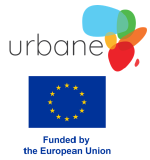Israël Gadji's farm
Agroecology, diversity of crops, soil fertility, compost, crop associations
Israël Gadji

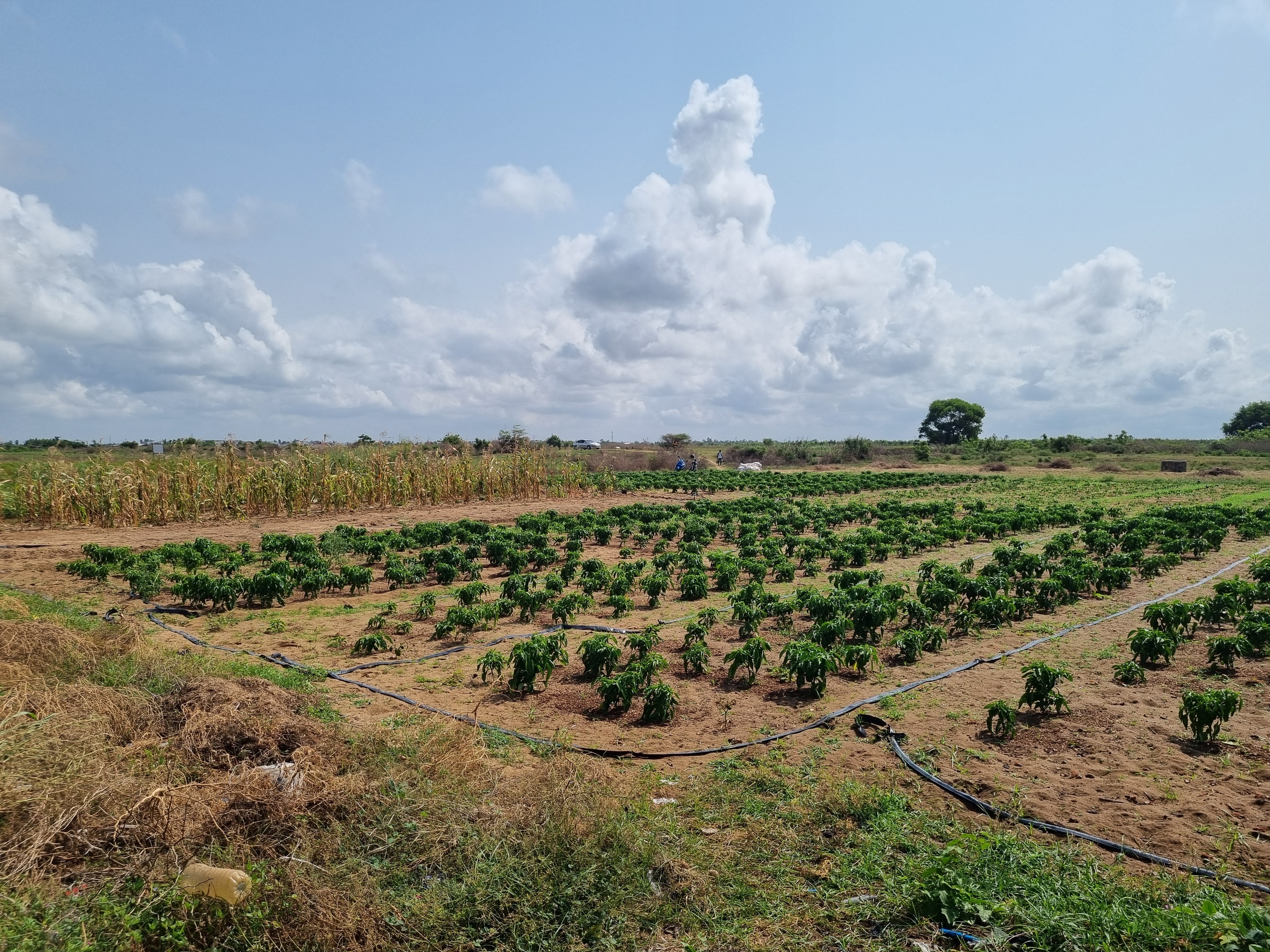
Israël Gadji, a farmer in Sèmè Kpodji, Benin, cultivates his land according to the principles of agroecology. Here is the profile of his farm.
Context
- Name: Israël Gadji.
- Location: Sèmè Kpodji, Benin.
- Date of establishment: 2004.
- Cultivated area: 4 ha. "I am in the process of expanding my cultivated area. I have one site that I have been cultivating for 20 years, another for 5 years, another for 2 years, and the last one is being cleared."
- Soil texture:Sandy.
- Number of people working on the farm: 4, but from March to June, 6 additional people. Israël hires day laborers for weeding and harvesting work.
- Productions:
- Vegetable crops: Tomato, chili pepper, bell pepper, carrot, lettuce, amaranth.
- Fruit trees: Coconut, sugarcane.
- Pig farming: Raising 20 pigs, 10 of "improved breed", 10 of local breed.
- Climate: Sèmè Kpodji has a savannah climate with a dry winter (Aw) according to the Köppen-Geiger classification. Sèmè Kpodji is an area with significant rainfall. Even during the driest month, it rains a lot. Over the year, the average temperature is 27.4°C and the average precipitation is 1217.1 mm.
- Education/training/life path:
- Child of a farmer, has been farming since a young age, helping his father in the fields.
- Master's degree in Applied Plant Biology from the Université d'Abomey Calavi (UAC).
- Internship at the National Institute of Agricultural Research of Benin (INRAB).
- He has been farming for about 20 years.
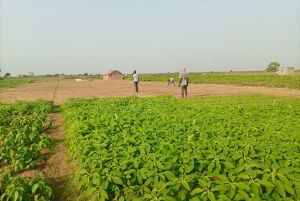
Motivations and objectives
Israël sees in agroecology a possibility for system change to reduce the use of pesticides.
He has several objectives:
- Achieve national and international reputation in market gardening.
- Significantly improve yields.
- Create an agricultural training center.
Agronomic aspect
Agricultural practices
Soil fertility management
- The soil is sandy, with very little organic matter and clay, very few nutrients and significant leaching.
- Israël uses chicken manure, cow dung, and soybean meal for the growth of vegetable crops. He applies them after transplanting. Animal organic matter is purchased jointly through the cooperative of which Israël is a partner.
- NPK, and urea are used for flowering and fruiting.
- Fertilizer is applied according to needs, which are mainly identified through observation.
Pest management
- Insecticide: Acetamipride-Lambda against whitefly, thrips, and aphids on tomatoes[1].
- Fungicide: Mancozeb, but this fungicide is now banned in Europe.
Insecticide and fungicide treatments are applied preventively.
Soil work
- Manual work with a hoe.
- Ridge cultivation.
- Work at a depth of 20-30 cm.
Strategies to address constraints
- Use of phytosanitary products (fertilizers and pesticides): Until this year, the price was very affordable, but now that the Beninese government no longer subsidizes phytosanitary products, Israël is looking for more economical alternatives to chemicals. This is one of the reasons he accepts conducting experiments on his plots, which will allow finding alternatives to the use of synthetic chemicals.
- Climate variability and production seasonality, which causes price drops and low production value (everyone produces at the same time, so the price drops significantly because there is more supply than demand). Israël is implementing an off-season crop in lowlands for tomatoes.
- The pressure of certain pests:
- Changing varieties to have varieties resistant to Ralstonia (bacteria).
- Use of amaranth to "clean" the cultivation beds of nematodes. "Amaranth is practically not sensitive to damage caused by nematodes. The larvae that penetrate the plant's roots do not develop. Moreover, harvesting by uprooting removes the nematode larvae that have penetrated the roots, leaving the soil more favorable for a subsequent crop of lettuce, okra, tomatoes, or other vegetables sensitive to root-knot nematodes."[2]
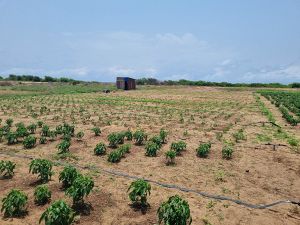
Water system
- Source, volume, and flow: borehole (8-9 m deep), 120 L/min.
- Irrigation method: perforated hose and drip irrigation.
- Watering frequency: at least 2 times a day.
Social aspect
Satisfactions / dissatisfactions
- Workload: 7
- Economic: 8
- Work comfort: 8
- Social: 9
- Living environment: 8
Scale from 1 = very dissatisfied, to 10 = very satisfied.
Environment
Technical support / assistance
PADMAR project for boreholes and irrigation systems.
Cooperation with other farmers
Discussions between cooperative farmers to improve production techniques or combat specific diseases or pests. They also engage in collective purchasing of raw materials, particularly organic matter (chicken manure, soybean meal, etc.), to reduce transportation costs and gain more negotiating power, thus obtaining organic matter at a lower price than if purchased individually.
Economic aspect
Land
The state owns the land, and he has a permit for its exploitation.
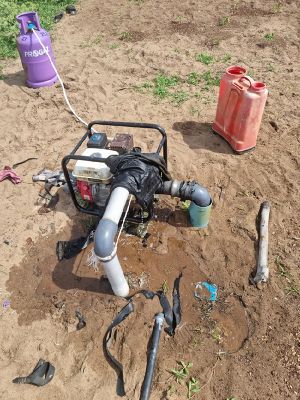
Equipment
- Pumps: 250,000 - 300,000 FCFA.
- Irrigation system (pipes, fittings): All pipes are 4m long:
- 75mm PVC pipe for the well: 20,000 FCFA.
- 75 pressure pipe for installation: 10,000 FCFA.
- 50 pressure pipe for installation: 5,000 FCFA.
- Elbows, T-joints, reducer: 2,000 FCFA each.
- 100m tape: 25,000 FCFA each.
- 50m connector: 50,000 FCFA each.
- Pot of glue: 5,000 FCFA.
- Watering nozzle: 5,000 FCFA each.
- Valve: 10,000 FCFA each.
- Saw blade: 2,000 FCFA.
- Fuel for the pump (gasoline, gas, and oil): 100,000 FCFA per month.
- Sprayers:
- Manual: 30,000 FCFA.
- Electronic: 50,000 FCFA.
- Tools (hoe, hoe blade, machete, etc.): 15,000 FCFA.
- Organic matter:
- Chicken manure: 50kg bags: 2,500 FCFA; 100kg bags: 5,000 FCFA.
- Compost: 20,000 FCFA for 50kg.
- Chemical inputs:
- Fertilizer (urea, NPK): 50kg bags range between 25,000 and 30,000 FCFA.
- Insecticides: Prices vary in the market.
- Fungicides: Prices vary in the market.
Donations, financial aid
The PADMAR project supported Israël in the construction of boreholes, and the acquisition of pumps and irrigation systems.
Expenses
Seeds, organic matter, phytosanitary inputs, sprayer: for tomatoes = 3 million FCFA.
Income
"If the season is good, I can make a turnover of up to 20,000,000 FCFA from all the crops."
Marketing strategy / outlets
- Sales to wholesalers. Most of the tomato production goes to Nigeria, where it is processed before being brought back to Benin for sale.
- Sales to intermediary "market women" who come to buy directly from the field edges.
The farmer's advice
- If you go into farming, do not do it to seek maximum profit. You must be passionate. Do not become a farmer just for the money.
- You must diversify production activities and the crops grown.
Photo gallery
Agroecological transition through experimentation
In the pursuit of a more sustainable and resilient agriculture, Israël has embarked on an experimentation of agroecology with the members of the University of Abomey Calavi and the team from Ver de Terre Production. This innovative initiative, undertaken within the framework of the URBANE project, aims to transform traditional practices by adopting environmentally friendly methods while preserving and/or improving agricultural productivity. At the heart of this approach lies the integration of cover crops associated with tomato crop rotation, followed by planting tomatoes in the ridges formed by cutting the cover plants.
The main objective of this experimentation is to improve soil structure and its fertility in terms of chemical, physical, and biological properties. By promoting biodiversity and reducing soil tillage, Romuald hopes to reduce dependency on chemical inputs and irrigation. By associating legumes and cereals as cover crops for tomatoes, the experiment aims to enrich the soil with nitrogen and organic matter, two essential elements for soil fertility.
Trial matrix
The experimentation is based on three cropping modalities:
Each modality includes a control without cover crops. These different cropping arrangements allow evaluating the effectiveness of various crop combinations in improving soil fertility. The setup is repeated over multiple cycles to measure the long-term evolution of results.
During the experimentation, several challenges were identified, especially regarding water and soil fertility management. Off-season cultivation, while beneficial for production, required more irrigation and labor. However, the improvement of soil structure through legumes and organic matter from the decomposition of cover plants offers promising prospects for reducing the medium-term needs for mineral fertilizers and irrigation.
Further experimentation and recommendations
To maximize the benefits of this experimentation, it's essential to optimize certain parameters such as irrigation, type, and management of organic matter. An adaptation of the trial matrix based on the specific conditions of the terrain will lead to more precise and replicable results.
Furthermore, it is recommended to continue research to refine agricultural practices and ensure a successful transition to a more sustainable and resilient agriculture.
Experimentation photos
Fertility trials
Establishment of experimentation: Planting and growth of cover crops
Experimentation monitoring: VESS test, MERCI method, and cover crop destruction
Ralstonia trial
Establishment of experimentation: Planting and growth of crotalaria cover crop
Experimentation monitoring: MERCI method and cover crop destruction
Sources
Interview with Israël Gadji conducted in March 2024 by the team of Ver de Terre Production as part of the Urbane project.
Photo credits: Israël Gadji and Alexandre Cottin.
This page was written in partnership with the Urbane project and with the financial support of the European Union.

